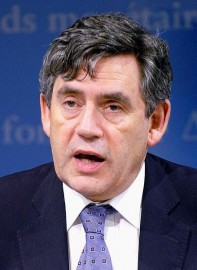
The newspaper articles welcoming Gordon Brown as the new prime minister all say that one of his undoubted achievements as Chancellor was to keep Britain out of the euro. Allow this blog to doubt how much of an achievement this really was.
Coming into office in 1997, his policy was in favour of euro membership in principle, but with concerns about the economic implications and also the undertaking to hold a referendum first.
The economic issues were refined, if that’s the word, into the famous five tests. The theory was that, when these tests had been judged to have been met, the British people could then be convinced of the economic reasoning, too. The five tests were there to help Britain join the euro.
In fact, the role of the five tests turned out to be to deflect criticism of British non-membership of the euro. “We’d like to join, but we can’t, because the tests haven’t been met yet.” The five tests were a means of keeping Britain out, and this is why the newspapers thank Gordon Brown.
But, there is more to the story than this. First, the economic obstacles to joining were certainly real. Fixing an exchange rate for ever is a serious undertaking and you have to be sure you are getting the rate right. The other EU member states spent 10 years or more in the Exchange Rate Mechanism, slowly adjusting and readjusting the relative values of their currencies. Britain joined the ERM late with the aim of reducing inflation, unilaterally declared a rate of 2.95 DM (rather than agreeing it with the others) and then refused to adjust it when circumstances required. It is not surprising that disaster followed. The rates were supposed to be fixed but adjustable but Britain treated them as fixed.
This goes a long way to explain Gordon Brown’s reticence. He had been in the Labour opposition at the time which had supported the argument for British membership of the ERM. Labour had narrowly lost the general election in 1992, but had they won, they would have been the ones holding the parcel when the music stopped. Frankly, they would probably have been even less likely to have asked for a renegotiation of the exchange rate before disaster struck: Labour was determined to prove its economic competence and lowering the rate would have appeared to have been an immediate admission of weakness. Labour being in charge when Britain was thrown out of the ERM would have destroyed that party’s economic reputation for ever.
So, the economic implications of trying to join the euro were substantial, and Labour was understandably fearful. But even if they had not been so afraid, what could they have done?
After all, joining the euro was a major economic policy effort in its own right. Think back to the strikes that paralysed France in November and December 1995, for example: Jacques Chirac was trying to make France ready for the single currency. Other countries had gone through similar extreme measures. Could Britain?
After 18 years of Conservative government, with Labour having endured years of frustration, was it likely that a Labour government would have made joining the euro a priority? Would they have postponed or abandoned all their other concerns in favour of the single currency? They had won the election on platform of defending the health service and improving education and dealing with lots of other costly problems which, they said, the Tories had neglected. Put in that light, a 1997 programme for euro membership looks rather hopeful (although of course it did not look that way at the time).
Gordon Brown eschewed what he characterised as a short-term decision – to join the euro – in favour of what he suggested were longer-term considerations, namely his broader economic policy. There the story might rest, except for one crucial fact.
That fact is that the eurozone itself is continually changing. With the apparent halt in the progress of the EU27 – the reform treaty will just about scrape through but it is hard to see what next – thoughts among the eurozone countries are turning to how that group might develop in the future. Some of kind of harmonisation of corporate taxation, perhaps, or a eurozone public debt provision, or corporate governance reforms for major companies established in the eurozone. Whichever they are, they will make the eurozone still more different from the rest of the EU and make the eurozone just that bit harder to join.
So when it finally sinks in the United Kingdom that a country with only 1 per cent of the world’s population cannot expect to sit in the front rank of the economic powers, and that membership of the eurozone is the natural solution to this problem, membership of the eurozone will be harder to achieve. Both politically and economically, joining the euro was never easier than in 1997, at precisely the time when Gordon Brown chose not to do so. Far from choosing the difficult long term option over the apparently easy short term one, it may well turn out that Gordon Brown’s decision on the euro was in fact the other way round.
